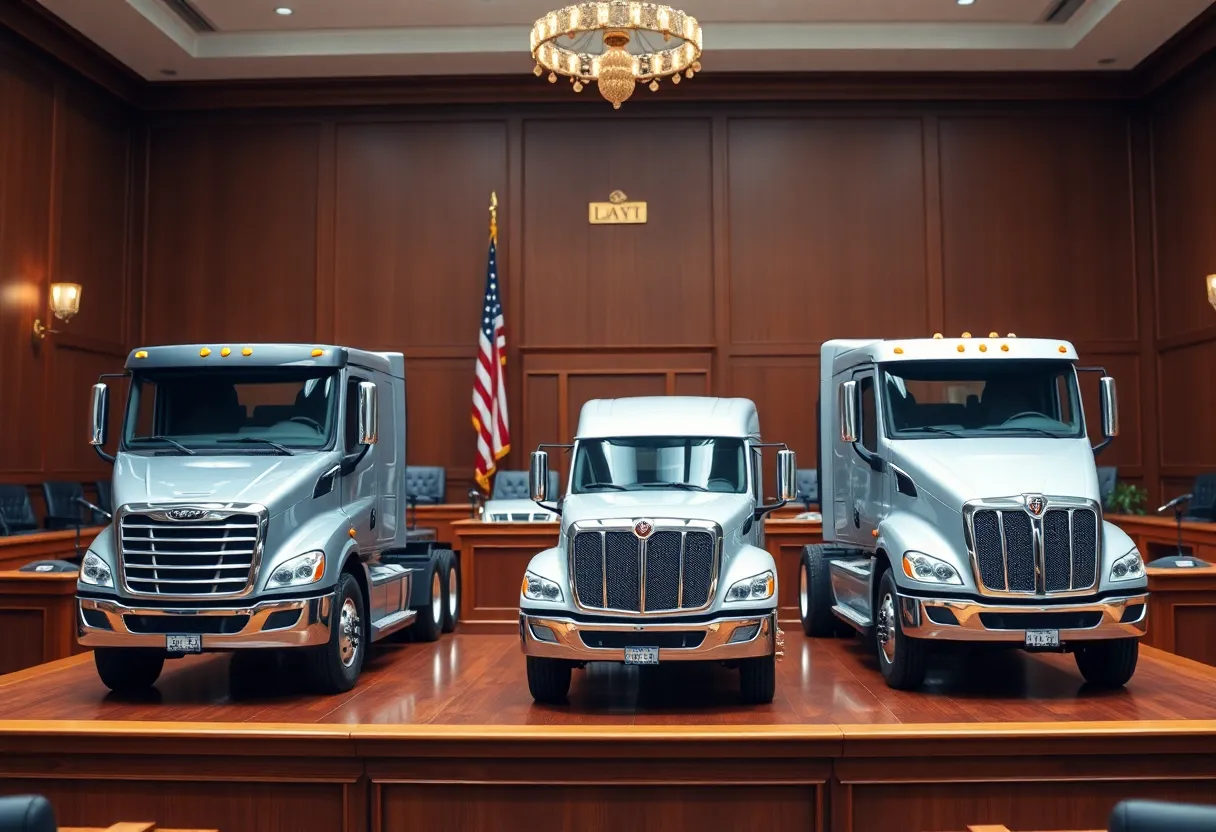News Summary
Major truck manufacturers have filed a lawsuit against the California Air Resources Board (CARB) in response to the enforcement of the Advanced Clean Trucks (ACT) mandate. The lawsuit is a reaction to recent federal policy changes that have invalidated California’s ability to set stricter emission standards. Manufacturers claim the regulations are unmanageable and hinder their operations. This legal battle underscores the conflict between California’s climate goals and federal regulatory rollbacks as the industry seeks clarity on compliance moving forward.
California – Major truck manufacturers, including Daimler, PACCAR, Volvo Group North America, and International Motors, have initiated a legal battle against the California Air Resources Board (CARB) in the U.S District Court for the Eastern District of California. The manufacturers aim to suspend the enforcement of the California Advanced Clean Trucks (ACT) mandate, citing a situation they describe as “impossible.” This lawsuit comes on the heels of federal actions that removed a waiver from the Environmental Protection Agency (EPA) which previously allowed CARB’s stringent regulations to proceed.
The manufacturers are reacting to recent changes in federal policy that include Congressional approval and action from the President, both of which have invalidated the exemption that allowed California to set its own emission standards beyond federal guidelines. As a result, the truck manufacturers assert that the regulations established by CARB are unmanageable and hamper their ability to operate effectively in the state.
The truck manufacturers’ association, the Engine Manufacturers Association (EMA), earlier forged an agreement known as the Clean Truck Partnership (CTP) in 2023. This agreement was intended to align compliance with the ACT while matching California’s standards to EPA regulations. However, subsequent federal actions have complicated this arrangement, prompting California to insist that the manufacturers must adhere to the CTP rules despite these challenges.
In response to these developments, CARB has also filed a lawsuit against the federal government, contesting the legality of overturning the waivers and asserting that EPA waivers are outside the scope of the Congressional Review Act. This back-and-forth underscores the complexity of maintaining environmental regulations amidst changing federal policies.
A recent communication from the Department of Justice on August 7 instructed Daimler to halt compliance with the CTP and abide by California’s vehicle emissions regulations. The truck manufacturers have since sought clarification from CARB on their obligations under the CTP, questioning the validity of its requirements in light of federal preemption.
CARB’s advisory note from May required engine manufacturers to comply with CARB’s preempted standards in order to conduct lawful sales within California. Governor Gavin Newsom has warned manufacturers that failing to comply with ACT mandates could lead to unfavorable regulatory treatment. While CARB has made modifications to the ACT to increase flexibility, it still refers to the commitments established in the CTP, leaving manufacturers caught between conflicting regulatory demands.
The lawsuit further highlights the challenges faced by truck manufacturers following the elimination of the Advanced Clean Fleets rule, which mandated that fleets purchase a corresponding percentage of zero-emission vehicles. The removal of this requirement has made compliance with the ACT increasingly arduous, leaving manufacturers with urgent needs for clarified emissions standards for the model year 2026.
The manufacturers’ legal claims assert violations of the Clean Air Act’s preemption provisions by California and challenge a specific provision in the CTP that blocks manufacturers from contesting CARB’s directives. The lawsuit seeks to issue an injunction that would prevent CARB from enforcing the ACT and other associated regulations.
While CARB has declined to comment on ongoing litigation, the Clean Freight Coalition has voiced its support for the manufacturers’ lawsuit, calling it a necessary step. Environmentalists, however, argue that the manufacturers’ position contradicts the original intent of the Clean Truck Partnership, which was designed to aid compliance during regulatory transitions.
This legal showdown exemplifies the overarching conflict between California’s progressive climate goals and recent federal regulatory rollbacks, placing truck manufacturers in a precarious position as they navigate these tumultuous legal waters.
Deeper Dive: News & Info About This Topic
- FreightWaves: Impossible Position Cited by Truck Manufacturers
- Wikipedia: Clean Air Act
- San Francisco Chronicle: California Trucking Lawsuit
- Google Search: California Truck Manufacturers Lawsuit
- Trucking Dive: OEMs Sue CARB
- Google Scholar: California Air Resources Board
- The Hill: Truck Makers Sue California Emissions
- Encyclopedia Britannica: Truck

Author: STAFF HERE HOLLYWOOD
The Hollywood Staff Writer represents the experienced team at HEREHollywood.com, your go-to source for actionable local news and information in Hollywood, Los Angeles County, and beyond. Specializing in "news you can use," we cover essential topics like product reviews for personal and business needs, local business directories, politics, real estate trends, neighborhood insights, and state news affecting the area—with deep expertise drawn from years of dedicated reporting and strong community input, including local press releases and business updates. We deliver top reporting on high-value events such as the Hollywood Bowl summer concerts, the Hollywood Christmas Parade, film premieres at TCL Chinese Theatre, and festivals at the Magic Castle. Our coverage extends to key organizations like the Hollywood Chamber of Commerce and Visit Hollywood, plus leading businesses in entertainment, dining, and tourism that define the local economy. As part of the broader HERE network, including HERELosAngeles.com, HEREBeverlyHills.com, HEREAnaheim.com, and HEREHuntingtonBeach.com, we provide comprehensive, credible insights into Southern California's dynamic landscape.



